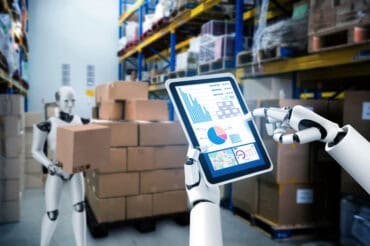
RPA and AI undoubtedly create efficiencies, but with those efficiencies comes an added human responsibility: monitoring results and ejecting, if not preventing, biases.
It is clear that 2020 will bring forth a tipping point in enterprise adoption of smart automation – artificially intelligent software bots that work with human workers to automate manual, repetitive tasks. Prior to the COVID-19 pandemic, more than half of U.S. businesses were already using this technology in daily operations. As businesses and governments continue to respond to the pandemic and the economic aftermath, automation will be even more pivotal as the pace of maturity accelerates, and the global economy reacts to it.
According to the McKinsey Global Institute, automation and advances in artificial intelligence (AI) will lead as many as 375 million workers, or roughly 14 percent of the global workforce, to reskill themselves by 2030 – more applicable than before as industries look to speed their recovery. As we approach the universal implementation of AI and automation in the workplace, we must take urgent action to ensure workers are prepared for the digitally enhanced future of work in our new normal.
See also: Humans are Key to Ethical and Responsible AI
While reskilling initiatives have often been touted as a silver bullet, not all programs are created equal. Much like the technologies driving the need to reskill, these initiatives much be highly scalable and broadly accessible.
I hope to unpack the challenges global enterprises and workers must face when scaling AI and potential solutions in the evolving workplace.
Eliminating Bias Blind Spots
RPA and AI undoubtedly create efficiencies, but with those efficiencies comes an added human responsibility: monitoring results and ejecting, if not preventing, biases. This work requires emotional intelligence, pattern identification, and, most of all, an industry-wide commitment to do better.
There are several ways enterprises can explore a more democratic, flat approach to AI, either individually or across industries, including:
- AI-focused industry groups and task forces designed to ensure safe and responsible AI while identifying and addressing areas of AI that require improvement for ethical, business, or performance issues
- Instructive white papers that could lead to informed regulation
- Leverage the increasing canon of academic research, as well as industry-led research that can help to address existing challenges
Most importantly, achieving greater diversity within the industry is paramount to preventing and addressing inherent bias in AI and automation solutions. We still have a very long way to go.
According to the World Economic Forum:
“… only 22% of AI professionals are women, and women face a greater risk of being negatively impacted by AI and automation technology. Lack of diversity fosters biases and narrows the focus of the problems new technologies are applied to solve.
Technology’s impact is dependent on how it is implemented and who is at the table when decisions are made – with women significantly underrepresented in science and technology roles. A lack of diversity across both gender and ethnicities not only perpetuates flawed systems based on limited experiences and perspectives, but the problems these technologies will be applied to solve are also shaped by the experiences of the individuals who create them.
Making Upskilling Accessible
An enterprise’s greatest asset is its workforce, and companies need to ensure employees are well prepared for the automation-driven workforce of the future – whether remotely or in a return to the office. Upskilling your existing base not only improves operations and productivity, but it also helps with employee retention and creativity – and attracts new talent.
However, focusing only on employee reskilling and upskilling means that entire workforce demographics will be excluded. These are often the same groups who will be most impacted by new technologies. Reskilling initiatives must include underserved populations at scale to recreate the entire U.S. workforce’s entire fabric and match skills to businesses’ long-term needs.
BitSource is one such organization tackling this challenge, addressing the needs of out-of-work Appalachian coal miners. After launching BitSource, the founders had funding for 11 coding slots, reserved for people with no prior coding skills. They received 950 applications.
Automation Anywhere this year partnered with PeopleShores, which brings jobs to economically disadvantaged communities in the U.S. through retraining in technology-enabled service centers, to train its members on Robotic Process Automation (RPA).
However, training may not be enough when it comes to addressing automation and workplace AI. An effective national reskilling strategy must involve public-and-private partnership to extend the reach of these efforts by targeting a talent pool such as veterans, who have adjacent abilities but may need new tools.
Training the Trainer
To have a real, meaningful impact, reskilling and upskilling initiatives must not only be inclusive but scalable. The ‘Train the trainer’ model is an effective way to reach the up to 375 million workers who will need to update their skillsets as society looks to economic growth and mitigate the pandemic’s fallout.
These programs can comprise e-learning, blended learning, or in-person learning, but they’re important because they’re self-sustaining. Take the Bitsource example above, where there were 950 applicants for 11 spots: if we teach workers to code and train them how to teach others to code, then communities can carry initiatives forward, and fundamentally transform the composition of local labor markets within a single generation.
Addressing societal bias, accessibility to training, and trainer enablement within communities will all play pivotal roles in making artificial intelligence and machine learning technologies more ethical in their delivery for the future of work. While conversations often focus on workplace efficiency, productivity and flexibility, I believe the most dramatic shift will be in the composition of the skills economy, and a hybrid public-private approach that makes reskilling sustainable, accessible, and scalable will best set future workers up for success in our new normal.






























